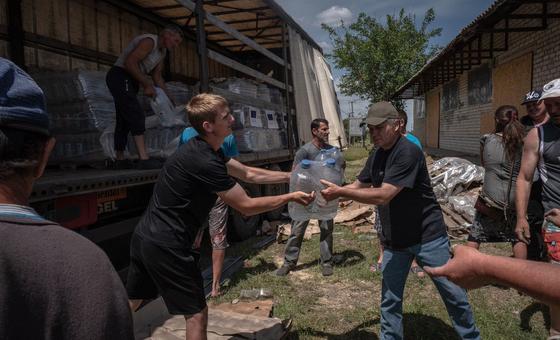Heavy rains and thunderstorms in the area of the Kakhovka dam disaster in southern Ukraine aggravated the humanitarian situation there on Monday, making evacuations and aid distribution harder.
That’s the latest from the UN’s aid coordination office (OCHA), which tweeted that the UN and its humanitarian partners have delivered vital supplies, mainly water, hygiene items and food, to cover the needs of nearly 180,000 people, despite the difficult conditions.
The number of people reached with aid is up five-fold since 9 June.
“Drinking water continues to be an issue”, and long-term solutions are needed immediately, the UN’s top official in the country, Denise Brown, said on Sunday, speaking from an evacuation point in Kherson city.
In a video tweet, she said that it was some solace at least to see “people coming together”, at a humanitarian hub she visited, which is supporting evacuees from the flood zone.
Volunteers, the authorities, agencies and other humanitarians had brought supplies, clothes, support and food, “to ensure that people like the people I have been meeting today…have a safe place to sleep, food to eat and support.”
IAEA still concerned over nuclear safety
Meanwhile, the UN’s nuclear safety watchdog, IAEA, has stressed the need to “clarify the reason for a significant discrepancy” between different measurements of the height of the reservoir whose water cools the Zaporizhzhya nuclear power plant occupied by Russia.
The level has been “dropping rapidly” since the Kakhovka dam, situated not far downstream from the power plant, was destroyed last week.
Aid continues
UN humanitarians in the region, along with partners, continue to deliver help those impacted, said UN Spokesperson Stéphane Dujarric, briefing correspondents in New York.
He said apart from the delivery of mainly water, hygiene items and food for nearly 180,000 – up from the 35,000 people reached last Friday – the UN was also supporting people impacted by water availability in the south of the country.
“Today, we delivered water and hygiene items to nearly 2,000 people facing water shortages in Pokrov, in the Dnipro Region. In total, since the dam was destroyed on 6 June, we have reached more than 5,000 people with cash and distributed more than 800,000 litres of bottled water and 70,000 monthly rations of ready-to-eat food.”
Mines alert
He said around 100,000 people had been reached regarding the risk of mine contamination, due to floodwater.
“We will continue to make every effort to help people in southern Ukraine, while also sustaining our humanitarian response in parts of the country heavily impacted by the Russian invasion”, Mr. Dujarric added.

